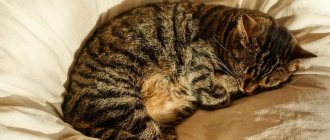If a cat often does not sleep at night and deliberately meows, wakes up the owner, pushes objects, then most often this is due to lack of attention. The pet needs communication, he wants the owner to pay attention to him and make contact. The owner of the animal has a job, acquaintances, friends, recreation, hobbies, but the pet only has an apartment and the person who tamed it. Therefore, of course, the animal wants attention from those closest to it. If you don’t always have enough time to play, then you can talk to the animal after returning from work, or pet it and allow it to be nearby. It is necessary to take care of the cat, comb it, try to really contact him every day and let him know that he is not alone. You need to try to pay enough attention, then the pet will feel an emotional connection with the owner, and he will not be so lonely.
The main reasons why a cat does not sleep at night
A healthy feline sleeps 2-3 times more than a human. The average adult pet should sleep at least 14 hours a day. So it is acceptable for a cat to sleep at night, wake up several times, lick itself, and then go back to sleep. But if the activity is not moderate, and the animal begins to walk back and forth, meow and does not allow sleep, then the second reason may be a feeling of hunger. In this case, cats are like wild animals. They need to satisfy their hunger, after which they will fall into a deep sleep for a long time.
Important! If your pet is eating well, but continues to behave this way, then you need to contact a specialist. This behavior may be a signal of psychological disorders. This could be a lack of security or stress. In such cases, a cozy place is allocated for the animal, where it feels protected and can sleep peacefully.
A cozy place for a pet that needs to be accustomed to in advance
If your cat starts to freak out or yell, it may be worried about health problems. Because, as you know, at night illnesses make themselves felt more strongly. But how do you know if this behavior is healthy or really a disease? An unhealthy pet begins to meow with different intonations, it even looks a little like howling or yapping. The animal is constantly trying to find a place to crawl into, cannot sit quietly in one place, walks around the entire apartment and meows continuously. This may indicate health problems. In this case, you need to immediately contact a veterinarian, and not wait until it passes, so that the animal does not suffer.
Remove sources of temptation
Cats like to climb to heights. When the owner is sleeping, the animal can jump from a high place directly onto a sleeping person. To avoid such a situation, eliminate all dangerous places where your pet lives: shelves, cabinets that you can climb on and then jump down. Move dangerous furniture away from your sleeping area. You can put things on top of them that are difficult to jump on and drop.
The measures taken will help wean the cat from performing acrobatic tricks at inopportune times.
What can interfere with sleep
The neighbor's dog howls at night: what to do, what to do
There are other reasons why an animal behaves this way.
- A cat most often does not allow its owners to sleep due to boredom. The reason may be the pet’s insufficient activity during the day, then it is in the evening that he begins to be awake, wants to play, and thereby prevents him from sleeping peacefully. A cat can jump on its owner while sleeping, and the owner, while asleep, will experience shock. The pet does all this not out of malice, he’s just bored, and has more than enough unspent energy. He needs somewhere to put his energy, especially before the age of 3. You need to play with him a lot, you can buy different balls, balls, lures on sticks and make him play even when he wants to sleep during the day. At least 1.5-2 hours of such frantic activity for young ones and up to an hour for adults, and at night both the cat and the owner will sleep soundly. It is clear that he may not sleep the whole night, then it is important to let the pet know where it is possible to make noise. For example, hiss at him when he starts to get active in the bedroom.
- When a pet is alone in the house all day, he needs attention and communication, he becomes bored, since entertaining himself is not always fun. Therefore, when the owner of the house, at night, the animal believes that this is just the time to pay attention to it and play. It begins to interfere with sleep, sometimes it can even scratch and bite its owner.
- Often the cause of insomnia in cats can be fear or fear of something. For example, a cat sleeps and wakes up from any rustle, this means that it is tense and afraid of something, so it is always on the alert. In such a situation, she will not fall asleep until everyone is asleep. Cats can even be afraid of their owners if they hit her or swing at her. They are very touchy and can be under constant stress because of this. You need to treat the animal kindly.
- Another cause of fear is electrical appliances, for example, a pet saw a vacuum cleaner, hair dryer or mixer at night. He immediately becomes furious and can start meowing and jumping. In this case, you should try not to leave these devices in a place visible to the cat, so as not to provoke him.
- Pets are also very afraid of water, so when their fur gets wet, it loses its warming functions, then the pet walks around the house for a long time, trying to warm up. So it’s better to bathe your cat during the day so that this doesn’t happen at night.
- Waking at night often occurs due to unfulfilled sexual instinct. This means that the cat needs to be sterilized or taken to a cat.
- If the pet is very timid and often hides in a corner when guests come, then at night it tries to regain the attention of its owners and tries in every possible way to attract it.
Ways to combat cat activity at night
The main reasons for increased activity at night and in the morning are lack of movement and communication during the daytime. Therefore, you need to try to eliminate these factors so that the cat, like the owners, rests peacefully at this time and does not create problems.
Most owners do not have the opportunity to give their pet much attention during the day; most hours are spent at work. This means that in the evening you need to compensate for the lack of communication. It is necessary to allocate time for:
- caresses,
- games,
- care procedures.
It is not necessary to sit next to the cat for hours, hold it on your lap and stroke it. You can just be next to your pet, do your usual things, but at the same time talk to him, sometimes stroke him. The cat will be happy to watch your actions and feel like a participant in the events.
Even at an advanced age, these animals love to play; for teenagers this is their favorite pastime. You need to not only buy toys for your kitten, but also take part in such entertainment. There are many different devices that make a cat become interested and start a fun game: a bow on a string, a moving toy. Tablet owners use their devices for cat entertainment. Many pets quickly master simple games in which they need to “catch” a spider, a mouse, etc.
In order for a cat that spends the whole day alone to be active and not spend all its time sleeping, you need to create conditions for entertainment. Many pets love to play with hanging toys; you can build a structure for your cat in the form of a tree, on which you can equip several beds at different levels. Animals are interested in toys with small objects placed inside, with a hole into which you can stick a paw, products with dry food, to obtain which you need to toss and roll them.
Cat toys need to be changed periodically. It is not necessary to constantly buy new options; it is enough to hide them for a while so that the pet has time to forget about them. When choosing entertainment, you need to make sure it is safe.
The cat doesn't let you sleep at night: what to do?
How to accustom a cat to a house and sleep in it
It's natural for a cat to be active at night. But it often interferes with sleep and is annoying. The owners want to know why the kitten does not let them sleep at night and what to do in such a situation. There are many options on how to deceive the cat's nature.
Barsik sleeps sweetly, but this doesn’t always happen at night
Therefore, below are several simple options for what you need to do to help your cat sleep at night.
- If an animal does not have enough attention, you can talk to it, stroke it, caress it, then the animal will calm down, feel cared for and will not be worried due to lack of attention.
- You need to help your cat reset the energy accumulated during the day. You can buy toys: mazes, houses, claw sharpeners, a ball, so that when the owner is not at home, she can have fun herself. It is better to choose interactive toys: squeakers, dialers, buzzers, so the cat will not be so lonely. If there is an opportunity to have another pet, that's good. During the day they will have much more fun, and there will be no problems with excess energy.
- Also, before going to bed, the owner can teach the cat to scout out the situation in the area. After he is convinced that everything is fine and there is no sign of danger, he will calmly go to bed.
- If possible, you can mount shelves on which your pet could climb.
- You can hide his toys around the house in the morning, thereby provoking the animal to search throughout the day.
- The animal should be left with food at night. If the pet gets hungry, it will not bother you by meowing, but will go to the bowl, satisfy its hunger and go on to sleep.
- You can arrange a place for your cat by the window so that instead of sleeping during the day, she can watch what is happening on the street.
- In the evening, you can show your cat special videos on your smartphone or TV. The net is full of them, usually there is a mouse running around, a fly flying or fish swimming. The cat will immediately become involved in the process and will want to catch the animals herself. Such an active activity before bedtime will warm up your pet a little, after which he will sleep soundly. Instead of a video, you can tie a ribbon to a stick and tease; cats love to run after something or catch something.
- Most of the food should be left for the evening. Once you are full closer to night, the likelihood of activity will be much lower.
- You cannot lock an animal in the bathroom or kitchen. At night it will try to get out, and there will be even more noise.
- The cat loves to get his way, so you should not give in to provocations. If the owner is sure that the pet is feigning and specifically demanding attention, then it is better to remain steadfast. Manipulations at night should be strictly ignored. But during the day it’s a different matter. You should actively communicate and play with the animal.
- You can also resort to retraining the cat. You should try to slightly shock the cat when he starts rustling: throw a plastic bottle or any other object with a ringing sound. Under no circumstances should you throw an object at him.
There is no need to worry unnecessarily that the animal sleeps a lot or vice versa. Everything is very individual, and if the cat has adapted to such a life, then it is better not to violate his personal boundaries and not disrupt the harmony.
The main thing that the owner must do is to contact the pet, arrange a secluded corner for it and try to tame it so that it at least sometimes obeys.
Sound cat sleep
The reasons why a cat stays awake at night are different: from a simple lack of attention to serious mental or health problems. If the lack of attention can still be corrected, for example, by playing more with the cat or communicating, then it will not be possible to cure the disease on your own. Even the same stress that causes laughter in some pet owners can provoke serious disorders. Fear or fear of something can seriously damage the nervous system. If, after trying all the options to ensure your cat sleeps soundly at night, nothing has changed, you should consult a veterinarian.
Animal hair cutter "Hello Pet", side, with curved blades, 8 blades, 2316208N
411 ₽ More details
Animal hair cutter "Hello Pet", straight, 11 blades, 2316111N
441 ₽ More details
Hello Pet Puffers
How to accustom your pet to its place?
Buying a house or bedding for a cat is half the battle. It can be much more difficult to accustom a kitten or an adult animal to it. First of all, care should be taken that the personal space of a mustachioed friend meets such criteria as stable construction, comfort, convenience, and free access. In this case, the animal will get used to it much easier.
It happens that a cat, having quickly examined a new house, immediately chooses it as its main place. However, this does not always happen, and to tame a pet you must resort to ingenuity. Among the basic techniques:
- accustoming to a new corner;
- the location of the house where the mustachioed friend likes to relax;
- soft coercion.
Features of training a kitten
It is important to ensure that the pet's bed is ready on the first day of its stay in the new home. It should be convenient for the animal to enter it and rest comfortably
During the cold season, additional heating may be needed. The baby will explore the territory for a long time, and it is important to observe his actions. If he likes a certain corner for relaxation, you should move the bed to it.
Lodge training can be achieved through a daily ritual. You should play with the kitten near the bedding and put his favorite toys there. A child who is playing up will not miss the opportunity to visit again where he was interested and comfortable. Having noticed that the animal is resting in the house, it is worth praising it and rewarding it with a treat. At first, you can place a bed or a house next to the chair where the owner is resting. When the kitten gets used to being on its bed, you should move its bed to the pet’s permanent sleeping place.
Techniques for “persuading” an adult animal
How to accustom an adult cat to a new house after it has been settled or moved? Conservative animals often ignore the bed, preferring to live on their favorite upholstered furniture or window sill. First of all, you need to guess with the placement of the new place. Sometimes it is enough to move the bed to where the pet likes to be. For example, on the sofa. The cat will like to sleep on a softer bedding, and if there are toys in it, he will not want to leave. After the mustachioed friend gets used to the bed, it can be placed in the corner where the owner needs it.
You can get used to the house in the same way, placing it near the places where the animal likes to be. You can encourage your pet to visit with toys, treats, kind words and praise. If you can’t influence an adult cat, you can buy “Catnip” spray (or valerian infusion) at a pet store and treat the animal’s bed. The smell will attract your pet, and he will be able to appreciate the comfort of his place. You need to use the product for several days. You can do without scents by laying a bedding or blanket in the house, which the mustache loves.
What diseases cause kittens to sleep for a long time?
Unfortunately, often the drowsiness of pets is not related to their physiological characteristics. Lethargy, decreased activity and too much sleep can be a sign of a number of dangerous diseases:
- parasite infestation; fleas, ticks, helminths;
- intoxication (food poisoning);
- intestinal obstruction;
- injuries: bruises, fractures, dislocations, sprains;
- urolithiasis;
- anemia;
- gastritis;
- leukemia;
- kidney inflammation;
- retroviral infection.
Associated symptoms. Typically, these diseases are accompanied by other alarming symptoms:
- weakness in the limbs;
- hyperthermia (increased body temperature);
- lack of appetite;
- refusal to drink;
- dry, rough nose;
- dullness and brittleness of wool;
- weight loss;
- lack of activity even during short-term wakefulness, while the awakened kitten does not play and does not respond to the owner’s calls.
All of the above changes are extremely dangerous for the kitten’s life and it is unlikely that he will be able to solve the problem with sleep. The situation requires the mandatory intervention of a veterinarian, competent diagnosis and treatment. Experts recommend not to hesitate and immediately seek professional help.
Source
Procedure in the bathroom
Because kittens have a shorter sleep cycle than adult cats, exclusion must be considered. Kittens also have immature brains and bladders. Your kitten will likely need to use the litter box at some point during the night.
If your kitten has been trained to use a litter box, make sure she has easy access to it. Don't place the litter box too close to your kitten's bed. The smell will be strong and will disturb the kitten's sleep. Just make sure your kitten has time if he wakes up during the night.
© shutterstock
If your kitten is not yet fully litter trained, you will need to use training pads. Before you put your kitten to bed, advise him to go to the toilet. Place the kitten in the litter box and use calming and attractive command words.
You can also stimulate your kitten's need to eliminate, just as its mother would. Take a damp, unscented wipe and gently wipe your cat's bottom with it. This will remind the kitten that it is being licked by its mother to encourage elimination.
If your kitten has an empty bladder and bowels, he will likely sleep longer. He may not make it through the whole 8-hour night. Kittens' bodies are too small for this. However, it will minimize sleep interruptions.
Dangerous symptoms
A kitten that sleeps a lot, does not like to play active games, eats poorly and eats little, may be seriously ill. Pay attention to your pet and the presence of other pathological symptoms. Signs of the disease :
- dry and hot nose;
- refuses to drink;
- temperature, body tremors;
- loose stools;
- vomit;
- pallor of mucous membranes;
- dull coat;
- impaired coordination;
- giving up your favorite treats;
- lack of reaction to people, loud sounds, lights;
- dilated pupils;
- rapid breathing.
Any of the listed symptoms is considered a deviation from the norm. To understand why your pet has stopped playing, eating and drinking, you need to consult a veterinarian.
If you know that the cause of poor health is poisoning, rinse the kitten’s stomach and give activated charcoal. After these steps, go to the veterinary clinic.
Source
After sterilization
In the first days after sterilization, the kitten is lethargic, eats little and sleeps constantly due to lack of strength and the effects of anesthesia. The animal needs to rest and gain strength after the stress it has experienced. Therefore, do not wake your pet, even if you think he needs to eat.
If the condition does not change for two days, you should consult a veterinarian. Perhaps the kitten has increased sensitivity to the components of anesthesia or an infection was introduced during sterilization.
If your cat tries to move and run after surgery, try to help and calm her down . Excessive activity can lead to injury and worsening of the condition.











